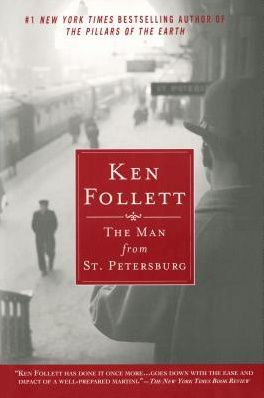

“Cómo debo vivir?». La respuesta de Tolstói era: «Tú conoces en tu corazón lo que es recto».”
― Ken Follett, quote from The Man From St. Petersburg
“—La moralidad de Tolstói. Hacer el bien tal vez no te haga feliz, pero hacer el mal seguro que te hará desgraciado. Ella”
― Ken Follett, quote from The Man From St. Petersburg
“La relación de amor no es la misma que la de la adoración. Se adora a un dios. Solo los seres humanos pueden ser amados. Cuando adoramos a una mujer no podemos amarla. Luego, cuando descubrimos que no es un dios, la odiamos. Eso es triste. —Nunca”
― Ken Follett, quote from The Man From St. Petersburg
“Growing up is learning to deceive.”
― Ken Follett, quote from The Man From St. Petersburg
“Englishmen did not speak to strangers on trains ...”
― Ken Follett, quote from The Man From St. Petersburg

“A man who has no fear can do anything he wants, Feliks thought. He had learned that lesson eleven years ago, in a railway siding outside Omsk. It had been snowing . . .”
― Ken Follett, quote from The Man From St. Petersburg
“the ultimate truth about oppression: that it works by turning its victims against each other instead of against their oppressors. He”
― Ken Follett, quote from The Man From St. Petersburg
“... sentiments which Feliks had already come to recognise as being characteristic of The Times, which would have described the Four Horsemen of the Apocalypse as strong rulers who could do nothing but good for the stability of the international situation.”
― Ken Follett, quote from The Man From St. Petersburg
“... people always credit prime ministers with more brains than they've got.”
― Ken Follett, quote from The Man From St. Petersburg
“La comida no era tan buena como la que le servían en su casa, pero la atmósfera era muy tranquila. Los sillones del saloncito para fumadores eran antiguos y cómodos, los camareros eran mayores y lentos, el papel de la pared estaba descolorido y la pintura había perdido color. Todavía tenían luz de gas. Los hombres como Walden acudían allí porque sus casas les resultaban excesivamente limpias y femeninas. —Dijo usted que casi lo habían”
― Ken Follett, quote from The Man From St. Petersburg

“So you’re a secret society … of librarians?”
― Ally Carter, quote from See How They Run
“Toda relação intensa entre seres humanos é cheia de armadilhas e, caso se queira que dure, é preciso aprender a desviar-se delas.”
― quote from The Story of the Lost Child
“This woman was eighteen years old. With eyes as old as stones.”
― Herbjørg Wassmo, quote from Dina's Book
“This is what love comes down to, things that happen and what we say about them.”
― Don DeLillo, quote from The Names
“See," he said, "the arrow struck against this. It is the kiss I gave her. It has saved her life.”
― J.M. Barrie, quote from Peter Pan in Kensington Gardens / Peter and Wendy
BookQuoters is a community of passionate readers who enjoy sharing the most meaningful, memorable and interesting quotes from great books. As the world communicates more and more via texts, memes and sound bytes, short but profound quotes from books have become more relevant and important. For some of us a quote becomes a mantra, a goal or a philosophy by which we live. For all of us, quotes are a great way to remember a book and to carry with us the author’s best ideas.
We thoughtfully gather quotes from our favorite books, both classic and current, and choose the ones that are most thought-provoking. Each quote represents a book that is interesting, well written and has potential to enhance the reader’s life. We also accept submissions from our visitors and will select the quotes we feel are most appealing to the BookQuoters community.
Founded in 2023, BookQuoters has quickly become a large and vibrant community of people who share an affinity for books. Books are seen by some as a throwback to a previous world; conversely, gleaning the main ideas of a book via a quote or a quick summary is typical of the Information Age but is a habit disdained by some diehard readers. We feel that we have the best of both worlds at BookQuoters; we read books cover-to-cover but offer you some of the highlights. We hope you’ll join us.